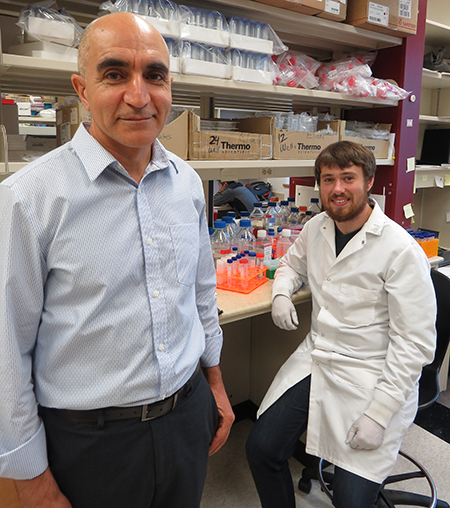
Immunologist and assistant professor Shokrallah Elahi and graduate student Garett Dunsmore have published research that shows an infant's immune system is fully developed at birth, but becomes suppressed by immature red blood cells.
Newborns are easily susceptible to catching colds and infections. Up until now, we've been led to believe that it's because their immune systems aren't fully developed or are immature when they are born.
New research published by School of Dentistry immunologist and primary researcher Shokrallah Elahi suggests a newborn's immune system is actually fully developed at birth, and identifying immature red blood cells (suppressor cells)―which are only present in infants―are responsible for keeping a baby's immunity from functioning at full capacity.
Published in the Journal of Immunology, Erythroid suppressor cells compromise neonatal response against Bordetella pertussis, Elahi's research team for the first-time has shown that these immature red blood cells, whose primary function is to carry oxygen through the blood, also have an immunological role―suppressing the immune system in newborns.
"Because babies are born not being able to talk or walk, we've generally assumed their immune systems like other body functions must be underdeveloped as well. By challenging this notion, our research has shown a newborn's immune system is not immature but highly suppressed," Elahi said. "Babies are physiologically enriched with immature red blood cells that cause the suppression. These cells are absent in healthy human adults."
But there's a reason for this immune system suppression in newborns says Elahi.
"This immune system suppression by the immature red blood cells at this early stage in life is essential for the swift adaptation of the baby's gut and skin to the good bacteria (microbiome)," he said. "Babies are coming out of a clean environment without any immune memory. Through the birth canal they get exposed to millions of germs and bacteria which are beneficial to the baby. So, if there immune system was functioning and was to fight back, it would be detrimental to the baby."
Elahi and his team are furthering this research study by now investigating how to manipulate these cells in order to protect the newborn against infections and at the same time allow the good bacteria to colonize in their gut.